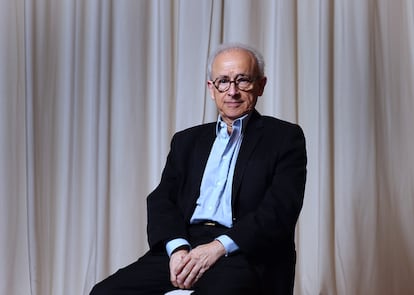Antonio Damasio, neurologist: ‘Our emotions can be good guides, but sometimes they derail us’
The Portuguese scientist talks about feelings, their role in the emergence of consciousness and how they connect us to other living beings

Eighteen centuries ago, the philosopher Plotinus stated that human beings are halfway between gods and beasts, sensing a path that linked our nature with that of animals. Charles Darwin, in The Descent of Man, elaborated on that perception by expressing his fears that many people would be annoyed by the main conclusion of his book: that humanity descended from an inferior organic being. Now, Portuguese neurologist Antonio Damasio has gone even further, stating that there is a link between our cultural life and the first microorganisms; that our consciousness did not arise suddenly, but is part of a path that, through feelings, links us to the beasts.
Sensations as basic as hunger, thirst or pain are behind the most sublime art and the most sophisticated technological advances. Fundamental feelings, he says, help us adapt to our environment and are the first step towards the consciousness that for millennia was the defining feature of humanity. Damasio is the director of the Brain and Creativity Institute at the University of Southern California (USC); his theories have inspired neuroscientists and intellectuals, and some of his books, such as Descartes’ Error, are a reference in the dissemination of science and philosophy. He recently visited Madrid, Spain, invited by the Bankinter Foundation, to talk about how the progressive knowledge of the brain is facilitating the brain-machine connection and the latest advances in artificial intelligence.
Question. You did your thesis in Lisbon in the 1960s. If you could travel back in time and meet your younger self, what would be the most shocking developments of recent decades for that other Antonio Damasio?
Answer. I did a doctorate in neuroscience, but I was I was also a neurologist and I trained as a neurologist. As a neurologist, I would be telling him about the spectacular developments in the way we can treat neurological diseases. For example, there is a remarkable set of developments in Lausanne, in Switzerland. They have restored the ability of a paraplegic to walk with electrical patches that stimulate the spinal cord. No one, 20 years ago, would have hoped for something like this.
The other thing is something that is astonishing but almost frightening: the possibility of having direct implants in our brain that can act on our mental functions and on the way we make decisions. They’re implants that can technically help someone that has a disease, like Parkinson’s, or an implant could help with Alzheimer’s disease, for example, with a recovery of memory. Of course, any time you plant something in your brain you face a lot of risks, infection risks and the damage that you could cause, as you are basically charting new territory. It’s like shooting for the Moon; you don’t quite know where you’re going to land. Newer technologies have enormous potential for good, but we have to move forward very cautiously so that we don’t make mistakes.
Q. Sometimes technological advances go in frustrating directions: we have phones to watch videos of kittens, but no flying cars, and we may develop implants to view those images without touching the phone, but we don’t make advances in the treatment of Alzheimer’s.
A. The commercial interests, of course, play a big role, because historically, human beings have done a lot of things because of the prospect of profit. But it’s also because there are certain things that fascinate people and others that don’t. Taking care of something very simple, like an upset stomach or a problem with the skin, is less fascinating than things like moonshots.
Q. You talk about motivations, and motivations have a lot to do with feelings, something you have researched and written about extensively throughout your career. If feelings are a tool to adapt to our environment, is it a good idea to always act on our feelings?
A. There are some feelings that we have to follow, and those are the homeostatic feelings [homeostasis is the body’s ability to keep its interior stable despite changes in the environment]. Our consciousness is made up of those feelings. For example, the feeling of body temperature. It’s monitoring you all the time, and it tells you what to wear or if you suddenly have a fever, that there’s something wrong with you. So feelings like body temperature, hunger, thirst, pain, well-being, malaise; that’s what I call homeostatic feelings, because they translate the state of homeostasis, which is the technical term for life regulation.
That’s what we think is the genesis of consciousness. Now, there are other feelings that are not good guides. For example, the feeling of ambition, the feeling of enormous joy and excitement, the feeling of envy, the feeling of anger or the feeling of sadness. Those are emotional feelings, and our emotions can be good guides sometimes, but sometimes they derail us. The emotion of ambition can be extremely destructive; anger too. One of the things which we most need to govern as individuals and as social and political agents is to guide a lot of the horrible things that emotions can lead us to do.
Q. But if we look at classical education, in part, it consists of fighting against feelings such as hunger or the search for immediate well-being in order to achieve freedom. It is using reason against feelings to achieve long-term benefits.
A. Homeostatic feelings are always positive because they tell you what to do immediately, but they also suggest a social and political project that could allow you to overcome problems of hunger and thirst. In the immediate term, they can save your life, but then, as motivations for social and political action, they can lead you to have the right development so that people can have food and water. So I think that they’re generally very good counselors.
Q. It also seems that emotions have more and more weight in politics. Does this have anything to do with an increase in the complexity of the reality in which we live and that comes to us through the internet? Do we take refuge in emotional intuitions when reality confuses us?
A. It’s not so much what we can do in terms of controlling the emotion, but in terms of trying to control the social effects of our own success. The internet is an incredible development in our lives. When I was in medical school, there was very little that I could find without going to a library. If I wanted to read an article by a scientist from another country, I would have to write [to ask for it]. Today I have that at my fingertips. That’s wonderful. On the other hand, the internet also allows social media to exist, and I think that a lot of what you’re describing is a side effect of the brutal development of social media, which allows you to constantly be confronting people. Instead of having a bit of time to think, analyze the facts, you can respond immediately.
A lot of good things came with these technical developments, but also some negative aspects. It used to be that you would spend some minutes, about three minutes, on a certain image, and now you spend 30 seconds. We have this acceleration of the way we deal with reality that’s largely being transacted through a device that you carry with you. I have this image, especially post-Covid-19, where I’m walking at the university at USC, which is a very nice campus, they have beautiful buildings, parks, trees, all of that. You see all these students walking around and talking and they bump into you. There are days in which there’s not a single person that does not have this thing in their hands. It’s amazing. How can you function that way?

Q. There is a book called Amusing Ourselves to Death, by Neil Postman, from 1985. It talks about how audiovisual culture and the dependence of American citizens on television are dumbing down people, making them incapable of paying attention to complex speech. You could change television for internet or social media in the book and the arguments would be identical to those used today to criticize them and, even so, we don’t seem to have become fools since 1985. Scientific advance is much faster now than then.
A. I think it’s not “us” in general. Some people are capable of surviving in this fast environment and being creative in spite of it, but there are some people for whom this is disastrous.
Q. When you were a student, the separation between humans and animals was much clearer. Only we had consciousness and there was less concern for the feelings of other animals. Now we think that we are all part of a continuum; that in the matter of consciousness there is no leap from the animal nothing to the human everything.
A. Exactly.
Q. Do you think that this imposes some ethical decision on us?
A. I think it’s quite apparent that there are lots of animals that are conscious in the same way we are. When you look at mammals, or fish, or birds, you don’t need to be very thoughtful or charitable towards animals to realize that those animals are aware of themselves, and protective of themselves, and operate in ways that are very similar to ours. They are capable of having feelings of pain, or pleasure, or hunger, or thirst. And they are operating according to very similar life regulation principles. I think, in relation to those animals that seem to have something that is very relatable to us, that we should behave in a very kind way. I don’t like to propose overlegislation, but we have to think in terms of the rights of those creatures. If we humans are very well educated, we will realize that we should not be torturing them. The business of recognizing consciousness should make you more aware of those creatures.
Q. But in these ethical and political decisions there is also a lot of arbitrariness, which perhaps has to do with the emotional part of supposedly rational decisions. There are people who easily accept this continuum between animals and humans and conclude that their lives must be respected, but then they say that abortion is acceptable before three months of gestation and not after, when there is also a continuity that is arbitrarily broken.
A. We are very smart at compartmentalizing things, you know. You can eat dogs, but don’t eat my dog.
Sign up for our weekly newsletter to get more English-language news coverage from EL PAÍS USA Edition
Tu suscripción se está usando en otro dispositivo
¿Quieres añadir otro usuario a tu suscripción?
Si continúas leyendo en este dispositivo, no se podrá leer en el otro.
FlechaTu suscripción se está usando en otro dispositivo y solo puedes acceder a EL PAÍS desde un dispositivo a la vez.
Si quieres compartir tu cuenta, cambia tu suscripción a la modalidad Premium, así podrás añadir otro usuario. Cada uno accederá con su propia cuenta de email, lo que os permitirá personalizar vuestra experiencia en EL PAÍS.
¿Tienes una suscripción de empresa? Accede aquí para contratar más cuentas.
En el caso de no saber quién está usando tu cuenta, te recomendamos cambiar tu contraseña aquí.
Si decides continuar compartiendo tu cuenta, este mensaje se mostrará en tu dispositivo y en el de la otra persona que está usando tu cuenta de forma indefinida, afectando a tu experiencia de lectura. Puedes consultar aquí los términos y condiciones de la suscripción digital.









































